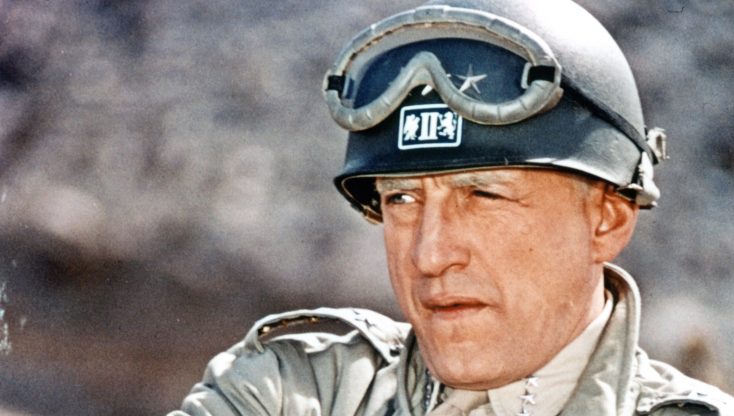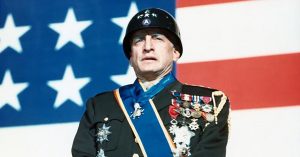By JUDY SLOANE
Special to Front Row Features
HOLLYWOOD—On Dec. 4, 1969, at the height of the Vietnam War, the motion picture “Patton” premiered in New York. But even during that time of animosity towards the military, the movie was critically and financially successful.
It spotlighted one of history’s most controversial figures in World War II, General George S. Patton, brilliantly played by the late George C. Scott, who went on to win the Academy Award for Best Actor, which he didn’t accept. I met with Scott at his Malibu home in 1995 to talk with him about the iconic film.
Judy Sloane: What was your reaction when they approached you about playing General Patton?
George C. Scott: I said, “It’s a helluva part.” When I read the script, I was fascinated by it, because (Francis Ford) Coppola had done a wonderful job.
Sloane: The movie’s director, Franklin Schaffner, said at a press conference that you were the only American who could play the role because you had the required vigor, anger and insanity to be Patton. What do you think of that assessment?
Scott: Probably right. I loved the Dutchman (Schaffner’s nickname). He always had a cigar in his face, and he was a grand director. I did two pictures with Frank: “Patton” and “Islands in the Stream.” Nice man.
Sloane: I can’t imagine the amount of research you did to play Patton. Were you trying to capture him physically or the essence of the man?
Scott: I was trying to do as close an imitation as I could possible do. We didn’t have tape in those days, so I had a movie projector in my home and ran a lot of film on him. I read about a dozen books, his and other people’s. I didn’t want to do the voice. The voice was different because it was high, and had a slight southern (accent), which was fine, I didn’t object to that, but I didn’t think I could duplicate it properly. So, I just did my own gravel nonsense, and it worked.
Sloane: Do you think he was a totally misunderstood man?
Scott: I don’t. I think he was an impetuous creature (who) really wasn’t terribly good at public relations.
Sloane: The movie started shooting on Feb. 3, 1969. Do you remember what the first scene was that was shot?
Scott: Yes, and I was not only hungover, but I was about three hours late. I’d been out with Jimmy Edwards, the guy who played Patton’s batman (Sgt. Major William George Meeks), and he and I really hit the bars that night. I was not in good shape, but I stopped in there and we got the shot. It was the painting scene where the guy was doing Patton’s painting, which didn’t look like General Patton, (and) didn’t even look like me.
Sloane: Why do you think you went out the night before and drank?
Scott: Nerves, sure. There’s no other reason. (I was) nervous as hell. (He laughs.)
Sloane: The first scene in the movie where Patton is talking to his troops is really a masterpiece for setting up the entire film. Whose idea was that?
Scott: Coppola, as far as I know. It was a compilation of a number of Patton’s speeches. He put them together—rather artistically, I thought. (We did it in) two takes. I knew I’d done well, I said to my agent when I walked out, “We got it.”
Sloane: What was Karl Malden, who portrayed General Omar Bradley, like to work with?
Scott: Karl was a joy to work with. He always used to tease me (because) it took so long with my make-up. He started calling me Marilyn. “Is Marilyn ready now? Can she come out and shoot the movie?” I didn’t mind; Karl’s a nice man.
Sloane: Do you have a favorite scene or moment in the film?
Scott: Yes, I liked the work I did with Jimmy Edwards (who died one month after the movie premiered.) I really enjoyed this patrician man and the Black aide. Their relationship was terrific, I thought. They were very close friends, as a matter of fact.
Sloane: In retrospect, is there anything in your performance that you would have changed?
Scott: Isn’t that an interesting question? Yeah, I was ashamed on the first day of shooting. I hit my boot with the riding crop, which is a very bad actor’s trick and I never should have done it. It was only because I was probably hungover that I did it. At least, I like to think that.
Sloane: And they left it in?
Scott: Yeah, they had to because it was an exit. But, aside from that, I was pretty proud of what I did.
Sloane: Why do you think the movie was so popular?
Scott: I haven’t a clue. They just liked the personality of the guy. That’s what I liked. He was such an affecting creature; such a dominant, dynamic fellow.
Sloane: When you asked them to take your name off of the Academy Award nominations, everybody knew you were not going to accept the award and they voted for you anyway. Did that surprise you?
Scott: Yes, as a matter of fact, I was shocked, to tell you the truth. I didn’t believe they would do that. I thought they shouldn’t do it, so why would they do that? And I got nominated again the next year for “The Hospital.”
Sloane: Why didn’t you accept the Academy Award?
Scott: Once and for all, I did not decline the Oscar; I declined the nomination. There’s a big difference. I felt it was unfair to accept the nomination and then if (I) won, decline. So, I sent a telegram the minute I heard I was nominated to the Academy and said, “’Please,’ in the words of Sam Goldwyn, ‘include me out.’” (They) said, “No, you can’t be included out.” (They) had no right to do that. That’s the way I felt about it.
Sloane: Do you want to say how you heard that you’d won?
Scott: (He laughs.) I was asleep, and my son, Alexander, woke me up and said, “Dad, you won.” I said, “Great, leave me alone.” (He laughs.)
Sloane: Whose idea was it to give the Oscar to the George Patton Museum?
Scott: (Producer) Frank McCarthy, I believe. He picked it up. The last I heard it was at the Patton Museum. I never saw it, never touched it.
Sloane: Talk a little about how Patton died.
Scott: All those speculations about him being assassinated are nonsense. It was a dreadful, stupid accident. (He was in a car) only going 10 or 12 mph. In those old cars, they had crystal glass covers over the lights and they were very strong, and he got a little bump and went up and hit that, smashed his head open and broke his neck. What a way to go. He would have much rather been blown to pieces.
Sloane: Out of all the great movies you’ve done, do you think you will always be remembered most for “Patton?”
Scott: I guess so. Cab drivers yell, “Hey, General.” I appreciate it in a way that people on the street say that they remember that (film).
Sloane: How do you feel Patton would want to be remembered?
Scott: Probably exactly as he was, except for that dreadful death.
Sloane: How would you like to be remembered?
Scott: Not even sure, dear. That I tried to do my best in this weird world and weird profession.
Portions of this interview were first published in Film Review Magazine.






